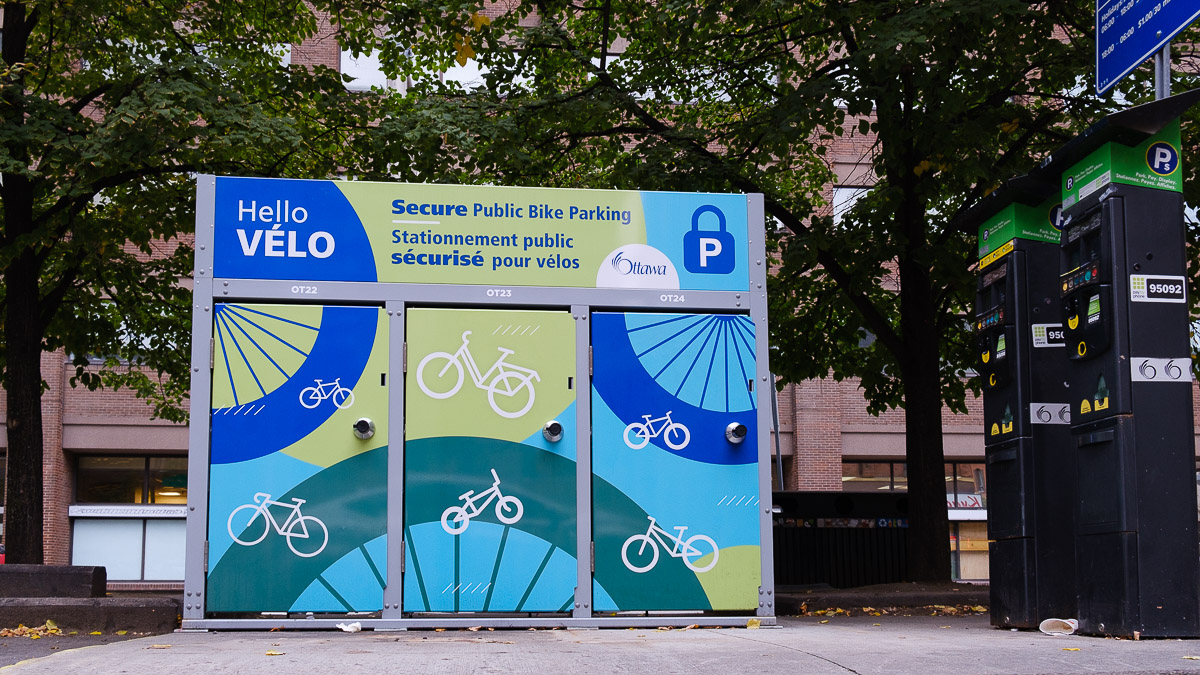Ottawa’s new bike-locker rentals appear to be off to a slow start, but the company behind the project says it expects the idea to catch on in the future.
“Historically … we see very few users at the beginning due to the small number of units and essentially no marketing program,” said Jean-Marc Blais, president of Velo-Transit, the Quebec company that manufactures, maintains and operates the lockers purchased by the City of Ottawa. “However, we typically triple our user base in the second year … and double that in the third year.”
In the first weeks of the service — the project began in Ottawa last month — few people have been seen using the three lockers. Capital Current visited two of the lockers on several days during evening commuting hours and only observed one person using the lockers. That user did not wish to comment.
Scott Caldwell, parking services manager, says the city was committed to promoting the use of the new lockers.
“The City of Ottawa has developed and issued communications content to support this launch and there will be social media posts to promote the lockers in the future,” Caldwell said in an email. “Staff are also working with stakeholders to promote these lockers and create awareness within the community.”
The locker service allows users to rent lockers with the Velo-Transit app at no charge for the first two hours, and 50 cents every hour afterwards.
The city installed the lockers on Sept. 11 in the ByWard Market, Centretown and the Glebe. According to Blais, each locker costs around $25,000 and can hold up to six bikes. There is also a cost for Velo-Transit to maintain and operate the lockers.

Velo-Transit said its goal is to create a network for cyclists. It has installed lockers in Gatineau, Trois-Rivières, Drummondville and Sherbrooke and a handful of other municipalities. Ottawa is the company’s first foray outside of Quebec.
Blais said the lockers are intended to offer a safe storage place to those who are uncomfortable leaving their bike outside for extended periods.
“I don’t think someone that doesn’t own a bike is going to start commuting tomorrow,” said Blais.
The bike lockers are the result of a wider “public bike parking strategy” study from 2021, wherein Ottawa hopes to help prevent bike thefts downtown and support the growth of cycling.
In 2023, Ottawa Police Services recorded 1,320 bicycle thefts in Ottawa. Almost 500 were recorded in Centretown and the surrounding neighbourhoods of ByWard Market, the Glebe and Sandy Hill.
Dave Robertson, vice-president of the cycling advocacy group Bike Ottawa, said bike theft is a “huge” barrier to more people using their bikes for commuting or running everyday errands.
Technical issues
Robertson said city staff have kept Bike Ottawa up to date on the new lockers, including some early technical issues.
“I think it was just some software issues … with people being able to use the app to unlock the lockers,” said Robertson, who said the city told him there was a fix and that Velo-Transit would push out an update.
Blais said Velo-Transit’s early “operational issues” are resolved.
As well, some lockers were shown on the app as occupied, but were not actually in use.
“Smaller, non-operational bugs will always need to be addressed,” said Blais. “We are still in the rollout phase until the end of October, which means it’s possible for a locker to be empty but still show as unavailable.”
Limited Rollout
Robertson said the rollout of bike lockers is “sorely needed” to combat bike thefts and encourage more people to take everyday trips by bicycle. He said to think of the bike locker launch as a “pilot project” for the city to work out any issues before installing more.
But he is concerned because the city announced in June it will cut what it spends on bike parking by 25 per cent.
“If you’re only getting the program going, and then you’re already talking about cutting it … why did we even start it to begin with?” said Robertson.
The city has not said whether it will invest more in bike lockers.
“The use of these lockers will be monitored, and additional locations will be considered going forward with the goal of removing barriers to cycling,” said Caldwell.
Blais, meanwhile, envisions a future where, in 10 years, the city could have a few hundred lockers placed across the city and 10 per cent of commuters would be commuting with a bike.
“So we’re dreaming here, but a calculated dream,” said Blais.




